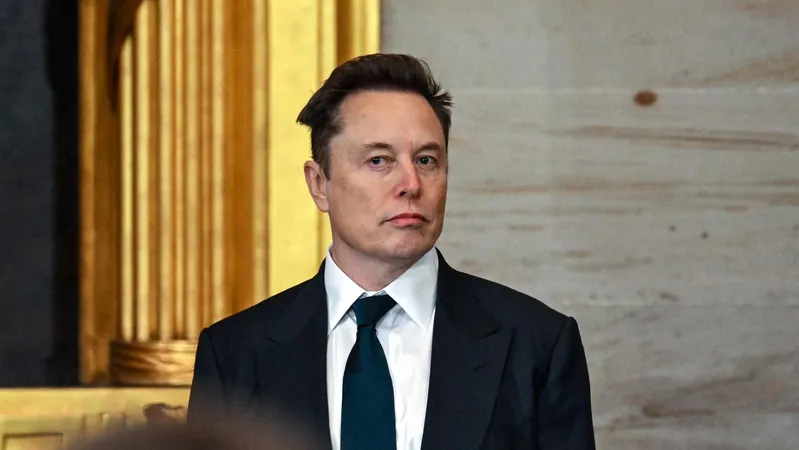
Hungary’s Historic Withdrawal from the ICC Amid Netanyahu’s Visit: A Shocking Shift in International Relations!
2025-04-03
Author: Ling
Hungary Withdraws from the ICC
In a groundbreaking move, Hungary has officially announced its withdrawal from the International Criminal Court (ICC) while Israeli Prime Minister Benjamin Netanyahu is visiting the country. This decision positions Hungary as the first European Union member to exit the global court, which was established to prosecute individuals accused of genocide, war crimes, and crimes against humanity.
Political Context
During a joint press conference with Netanyahu, Hungarian Prime Minister Viktor Orban sharply criticized the ICC, claiming it has devolved into a 'political court.' He cited the court's decision to issue an arrest warrant against Netanyahu as a clear indication of its political bias. Netanyahu echoed Orban's sentiments, praising Hungary's withdrawal as a 'bold and principled' stand against what he described as a 'corrupt organization.'
Shifting Foreign Policy
This dramatic turn of events isn’t merely symbolic; it accentuates Hungary’s shifting foreign policy under Orban, who has prioritized strengthening ties with Israel while adopting a more skeptical view toward international institutions that he believes encroach on national sovereignty. Orban's government perceives the ICC as biased against Israel, a viewpoint echoed by Israel's Foreign Minister, Gideon Sa'ar, who remarked that the court has lost its moral authority due to its treatment of Israel's right to self-defense.
Broader Implications
However, Hungary's move has broader implications for the international legal landscape. The ICC, which currently has 125 member states, may not see an immediate operational impact due to Hungary's withdrawal, as ongoing proceedings will continue unaffected. Historically, the court has managed to navigate similar political challenges with resilience, bolstered by substantial international support.
Concerns Among Legal Experts
Yet, Hungary’s decision to withdraw raises concerns among legal experts and international observers that it may set a precedent for other countries to similarly question or abandon their commitments to international justice based on political motivations or associations. Notably, several nations—including the U.S., Russia, China, and North Korea—have never recognized the court’s jurisdiction, while Israel has also refrained from joining the ICC treaty following its establishment.
Withdrawal Process
With Hungary's withdrawal contingent upon a written notice to the UN Secretary General, the process will take effect one year later, as stipulated by the Rome Statute. In the meantime, ICC spokesman Fadi El-Abdullah reminded that Hungary still has obligations to cooperate with the ICC, despite its withdrawal announcement.
Legal Complications
Notably, since the warrants were issued, the legal obligations surrounding potential arrests of individuals like Netanyahu become complicated. While certain European states hinted at apprehending Netanyahu if he entered their territory, others, like Germany, have stated he would not face arrest—a divergence in approach that raises questions about enforcement of ICC directives.
U.S. Response
The U.S. has also condemned the ICC’s warrant against Netanyahu, showcasing its alignment with Israel. As Netanyahu continues to navigate this politically charged environment, his visit to Hungary—his first trip to Europe since the arrest warrant—signifies ongoing alliances that challenge international norms.
Conclusion
In a global environment where the standards of international law are increasingly contested, Hungary’s dramatic departure from the ICC serves as a stark reminder of the changing geopolitical landscape and the tensions between national interests and collective accountability. As nations deliberate their positions on international treaties, the implications of Hungary's withdrawal could resonate far beyond its borders, potentially reshaping the future of global justice.



 Brasil (PT)
Brasil (PT)
 Canada (EN)
Canada (EN)
 Chile (ES)
Chile (ES)
 Česko (CS)
Česko (CS)
 대한민국 (KO)
대한민국 (KO)
 España (ES)
España (ES)
 France (FR)
France (FR)
 Hong Kong (EN)
Hong Kong (EN)
 Italia (IT)
Italia (IT)
 日本 (JA)
日本 (JA)
 Magyarország (HU)
Magyarország (HU)
 Norge (NO)
Norge (NO)
 Polska (PL)
Polska (PL)
 Schweiz (DE)
Schweiz (DE)
 Singapore (EN)
Singapore (EN)
 Sverige (SV)
Sverige (SV)
 Suomi (FI)
Suomi (FI)
 Türkiye (TR)
Türkiye (TR)
 الإمارات العربية المتحدة (AR)
الإمارات العربية المتحدة (AR)